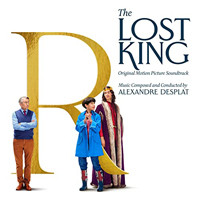Richard III is not just notable for inspiring a great piece of Cockney rhyming slang, he was also (I suppose) worthy of note as the last of the Plantagenet line of English monarchs before being slaughtered by Henry VII who started us off with the Tudors. In 2012, his remains were found underneath a car park in Leicester. Now, I have to say I’ve been on my back in a car park in Leicester on more than one occasion and nobody has ever made a film about finding me, but I suppose I won’t get too bitter about that. The Lost King documents the search for his remains and includes ghostly visions of the king himself appearing to the searcher.
Stephen Frears used to enjoy a very fruitful collaboration with George Fenton but over the last few years, Alexandre Desplat has firmly established himself as his composer of choice. The composer – one of the best we currently have in film – has given him some great music for The Queen, Philomena (what a main title piece!) and others. The Lost King feels to me like his most significant and impressive score since Little Women – full of a surprising amount of emotion, beautiful colours and a pair of great themes, it’s a real winner.

The titular opening cue is a real barnstormer – it feels like Bernard Herrmann, absolutely frantic with energy and based around these little clusters of music that get repeated and revised – it sounds serious but there’s a playful quality to its construction. An ode to North by Northwest, perhaps? While that bustling style isn’t heard too often through what follows, the central melody (which is vintage Desplat) does.
The other primary theme is a lilting melody which instantly takes its place amongst the composer’s most attractive. James Horner-style, it repeats a descending three-note figure before resolving with an upward leap and it’s a real winner. Not at all overused on the relatively brief album, it’s a real treat whenever it appears.
Overall though, Desplat scores the film like it’s a mystery thriller (which I guess in a way it is) – there’s a real driving energy through his music even when the orchestral forces are not at their mightiest, which gives it a genuinely compelling narrative arc. Alongside the London Symphony Orchestra he uses some soloists playing medieval instruments to add period colour for Richard’s ghostly appearances and this adds something of a USP to the score to set it apart – the whole thing feels really quite serious, but most of the time with a glint in its eye. That’s a great combination.
There’s a real frantic feeling to “We Found Richard” as the score enters its wonderful concluding section (these last three cues are all great); then a grand statement of the main theme in “Farewell Richard”. The final piece “Bosworth” then has a very slightly mournful feel – a reflection on the king’s final moments and the resting place he would occupy for several hundred years afterwards (the last few decades of those having a car park on top of his head – perhaps the only monarch in global history who could make such a claim). A great score – if not Desplat at the very, very top of his game then certainly the pick of his music from the last few years.












It‘s quiet in here! Why not leave a response?